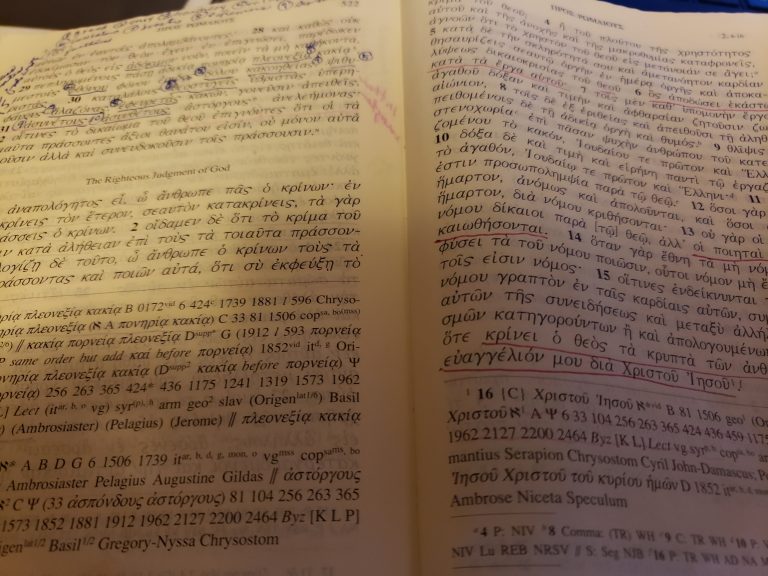Using Reason to Judge Revelation
One of my objections to inerrancy is that it is impossible to demonstrate. Lacking a perfect standard external to the Bible and also lacking perfect understanding, we are unable to actually demonstrate that the Bible is, in fact, without error. Some apologists seem to believe that if we just apply the right set of standards to all the literature before us, the Bible will stand out as inspired and inerrant as opposed to all other claimants.
The problem is that if God reveals something to you that you cannot know in any other way, by what means do you determine that it is true?
Previously I have written that determined what is an authoritative, inspired source is defined within a community, rather than in some externally objective fashion. Thus if one wanted to compare the revelations of Christianity and Islam, the Bible and the Qur’an respectively, one would need to compare the communities rather than the books. In practice the books are defined and judged by the communities involved. That sort of comparison is a daunting task, and neither of these communities (nor any others I know of) consistently seem to come out well. There is always the “everybody’s human” dodge, but that only makes it harder.
Christopher Smith discusses some issues related to this in his post Some Objections to Newman’s Anti-Rationalist Polemics. There his main concern is applying our conscience to scripture. For example, what does one do about commands to genocide in scripture? This is a question closely related to my current series on theodicy.
Referring to Newman’s claim that scripture is not to be judged by its contents, but rather by its credentials (an iffy proposition, to say the least!), Chris says:
The kind of thinking described above may resolve the problem of divinely-ordained genocide in the Old Testament for the Bible inerrantist, but it also resolves the problem of divinely-ordained unbeliever-killing for the Muslim Brother. And of course, Newman applied it selectively. . . .
I would add that if anything God commands is right by virtue of the fact that God commands it, a variation on this same statement, then how can one possibly tell the difference between divine and demonic? This is a major reason that I often equivocate (or some would probably use less charitable words) on the revelation aspect of scripture and dwell heavily on the experiential aspect. I tend to see scripture as a record of experience with God, revelatory in the sense that I judge it to be experience of the divine, but not in the sense that it provides extraordinary information that could not be acquired otherwise.
Now there must be revelation in there if people are experiencing God, but we have a very imperfect idea of what is divine revelation and what is part of what we bring to the table. On the key question here, acts of God which seem to be morally reprehensible, I would say that we need to ask just how much of all of that was what God brought to the table, and how much was the result of what humans brought with them.
I would submit that even when we have come through an experience that we say has profoundly changed us, we have only been changed a little at a time.
Chris starts his concluding paragraph thus:
Reason, of course, can lead people to differing beliefs, as well. I do not claim that reason is perfect, pure, or easy to use. . . .
Good point, and that’s why we constantly put things to the test, both of reason and of experience. When someone comes out and says, “God told me to injure or kill people for no valid reason,” we can know that it’s wrong, and by definition, if wrong, it is not God.


You ask an interesting question, Henry:
But the way you answer it shows a lot about how you think. You seem to assume that the truth of a statement about God, or at least about the Bible being inerrantly inspired by God, can and should be demonstrated by human methods and reason. This is a fundamental presupposition of Enlightenment liberalism, but not of biblical Christianity. The biblical or at least pre-Enlightenment approach to such questions is rather that they should accepted by faith. I understand the objections to that approach taken on its own.
But to me there is another basic aspect to this which you do not mention, and that is the link between knowledge and relationship. If your wife tells you something, I hope that you don’t require that she demonstrates the truth of it to you, but that you accept it on trust because you know her and trust her. And if you get a message which purports to be from her, you can very often recognise whether it really is from her or not from the language and tone – and if it is not you can call her and ask. On the same basis, I have a relationship with God through Jesus Christ. Because of this I am in a good position to recognise whether any message purporting to be from him actually is, from whether it ties up with his character. And if I am unsure I can ask him in prayer and trust him to guide me by his Holy Spirit about whether it is true or not. So I don’t need any external demonstration of whether the message is genuine or not.
This does not completely resolve the issue of “how can one possibly tell the difference between divine and demonic?” But it does imply a consistency: either I have a genuine relationship with God and can know the truth about what he says from him; or (as some people have suggested in response to my defence of Todd Bentley) my relationship is really entirely with demons which are deceiving me. At this point I have to go back either to the Bible or to general revelation about morality, and appeal to them to argue that the good things that come out of my relationship show that it is with God and not demons.
It would take another few steps to apply this argument to the issue of inerrancy, which in fact I would not want to uphold in its standard US evangelical formulation. I write this just to show that for me the issue is not of whether inerrancy can be demonstrated or judged by human reason.
Peter-I think you make a number of good points, but did you fail to notice that it is the idea of creating a view of revelation that is judged by human reason to which I am objecting.
One of the frustrations of blogging is that even for someone who writes as long of posts as I do, many things are not discussed. I should have linked to my previous posts in which I express my own actual view of inspiration.
I do think that inerrancy, as defined for example by the Chicago Statement, is predicated on judging the Bible by human reason, in spite of claims to the contrary. But that is another, longer subject. (Note that Norman Geisler, for example, claims that one must accept inerrancy as a presupposition.)
In your post you say that one of your objections to inerrancy is that it is impossible to demonstrate. I am a complete neophyte at discussing these types of issues from an theological apologetic point of view, but I can say that the whole of much of our mathematics is built on principles that we really cannot demonstrate. We use axiomatic propositions to build further proofs that have served us quite well. The truths of the axioms are found in their application, not as characteristic of the axiom itself.
The mere fact that something cannot be demonstrated isn’t necessarily reason for rejecting it. It seems to me one could start with an axiom of inerrancy and build from there. If the end result is useful and applicable, there’s no need to question the underlying axiom.
Larry- I see your point, but I also saw that point before. As I mentioned to Peter, Norman Geisler is one advocate of inerrancy who says we must accept it as a presupposition. Personally, I don’t think the results are “useful and applicable.” In fact, I think the results are atrocious. But that’s a whole new topic.
But this is a subject on which I cannot tie up all the loose ends in one blog post. I even wrote a complete book (When People Speak for God on the topic, which outlines why, despite what I have said in this post I do believe God has revealed himself in the Bible and why I do believe we can discern the divine from the demonic.
You wrote: This is a major reason that I often equivocate (or some would probably use less charitable words) on the revelation aspect of scripture and dwell heavily on the experiential aspect.
Me too – if we have no experience of the risen Christ – then there are better things to do.
How do I know my experience is from God – because I learned it thorough the death of Jesus – what a thorough surprise!
Having learned this, I begin to read the canonical testimonies with a completely different – a-logical – perspective.
I do not subscribe to untested enthusiasms – but I have been changed in my walk of faith. If I had not been changed, I might no longer be walking. If I had not believed, I might no longer have been here to write.
I believe therefore I have ‘written’ briefly to you, Beloved.
Hey Henry,
Thanks for the link to my blog, and the thoughtful remarks. Obviously I agree with you, especially where you said the following:
<blockquote cite=”I tend to see scripture as a record of experience with God, revelatory in the sense that I judge it to be experience of the divine, but not in the sense that it provides extraordinary information that could not be acquired otherwise.
Now there must be revelation in there if people are experiencing God, but we have a very imperfect idea of what is divine revelation and what is part of what we bring to the table.
Well said.